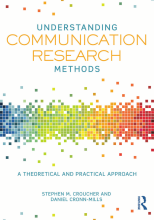Research Design - Evaluating Research-Warrants - Warrants for Evaluating Interpretive Research
11 important questions on Research Design - Evaluating Research-Warrants - Warrants for Evaluating Interpretive Research
Which 8 criteria/warrants do interpretivists use to evaluate what is good?
2. Rich rigor
3. Sincerity
4. Credibility
5. Resonance
6. Significant contribution
7. Ethical
8. Meaningful coherence
What is a fundamental difference between social scientific and interpretive researchers?
What does the first warrant (worthy topic) entail?
- Higher grades + faster learning
- Never study anything twice
- 100% sure, 100% understanding
What does the second warrant (rigor) entail?
1. Am I using the most appropriate theory/theories?
2. Did I spend enough time in the field? (if you collect data in the field)
3. Is my sample the right size, the right data?
4. Are my data collection and analysis techniques the correct ones for what I am doing?
What does the third warrant (sincerity) entail?
Which 4 contributions do interpretive studies make to scholarship? (the sixth warrant)
1. Theoretical
2. Heuristic
3. Methodological
4. Practical
A study does not need to make each contribution, but al least one.
Which 4 contributions do interpretive studies make to scholarship? (the sixth warrant)
1. Theoretical
2. Heuristic
3. Methodological
4. Practical
A study does not need to make each contribution, but al least one.
What does the seventh warrant (ethical) entail?
What does the seventh warrant (ethical) entail?
What does the eight warrant (coherence) entail?
E.g. If you want to study attachment between partners, don't study lust, love, jealousy, but really attachment.
What does the eight warrant (coherence) entail?
E.g. If you want to study attachment between partners, don't study lust, love, jealousy, but really attachment.
The question on the page originate from the summary of the following study material:
- A unique study and practice tool
- Never study anything twice again
- Get the grades you hope for
- 100% sure, 100% understanding































